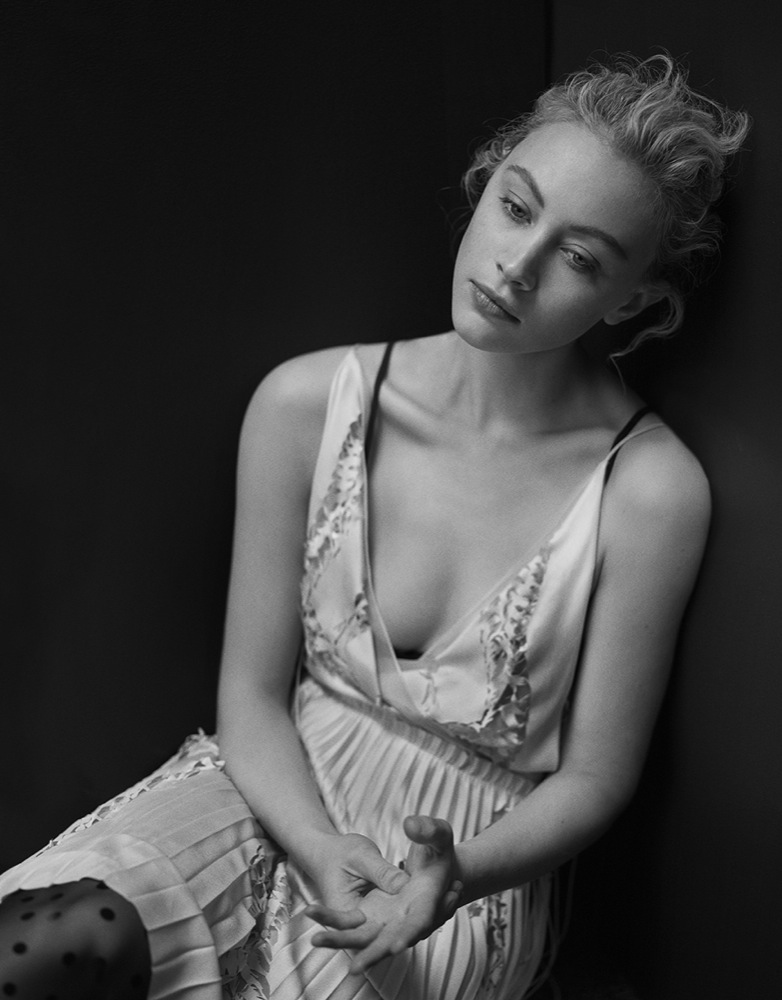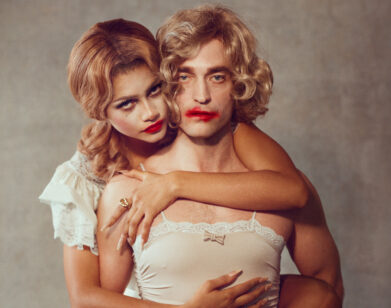Sarah Gadon’s Women on the Verge
SARAH GADON, FEBRUARY 2016. PHOTOS: THOMAS WHITESIDE. STYLING: KATIE BURNETT. MAKEUP: JUNKO KIOKA/JOE MANAGEMENT USING GIORGIO ARMANI BEAUTY, INCLUDING MAESTRO GLOW. HAIR: JOEY GEORGE/THE WALL GROUP USING ORIBE. STYLING ASSISTANT: LAUREN PIVEN.
There is a moment in Indignation when Marcus Messner (Logan Lerman) accuses Olivia Hutton (Sarah Gadon) of being “under control.” “You really think so, do you?” she replies. “I, who have 8,000 moods a minute, whose every emotion is a tornado, who can be thrown by a word, by a syllable, am ‘under control?'”
Set in the early 1950s and based on the novel of the same name by Philip Roth, Indignation follows Messner, the son of a kosher butcher, from his small New Jersey town to a conservative college in the Midwest. Marcus is measured and intelligent. Every action he completes is part of carefully considered plan of events. At Winesburg College, he is an outsider. Then he meets Olivia Hutton.
In a Hollywood landscape where female characters are often ornamental, Olivia Hutton is a rare whole. “The thing about Olivia is you never really know when she is telling the truth,” says Gadon. “Is this the lie to herself? Is that the lie to him.”
The daughter of a teacher and a psychiatrist, Gadon began acting professionally when she was still a child. At the age of she 11, she booked her first on-screen role as a guest star on La Femme Nikita. “I played an Eastern European daughter of a terrorist,” she recalls. “It was very dramatic, I had an accent. It was awesome.”
Now 28, Gadon has an enviable resume. In recent years the Toronto native has worked with the likes of Denis Villeneuve (Enemy), Mary Harron (The Moth Diaries), Julian Jarrold (A Royal Night Out), David Cronenberg (A Dangerous Method, Cosmopolis, Maps to the Stars), and Cronenberg’s son Brandon Cronenberg (Antiviral). Last month, Indignation, the directorial debut of producer and former Focus Features co-founder James Schamus, premiered at the Sundance Film Festival in Utah. Last week, her new J.J. Abrams-produced television series 11.22.63 debuted on Hulu. It, too, is based on a novel, this time by Stephen King. In it, Gadon plays Sadie Dunhill, a young Dallas divorcée in the early ’60s who gets roped into a plan to stop the assassination of JFK by a 21st-century time traveler named Jake Epping (James Franco). It sounds bizarre, to say the least, but it only takes one episode for the viewer to suspend belief and accept the premise.
EMMA BROWN: You’ve talked about how you feel that Sadie represents a time of innocence in the U.S.
SARAH GADON: The way I sometimes approach my work, when I look at a script for the first time, is to identify what the archetypes are and what the writing is trying to do in that context. When I first looked at 11.22.63 and I read the novel, it seemed very apparent that Stephen King was making this analogy about JFK representing a real time of innocence for America. Sadie was a manifestation of that innocence. He does that more overtly in the novel by making her a virgin in a small town. Bridget [Carpenter, the showrunner], in the script, chose not to make Sadie an actual virgin, but more representative of that innocent time and a coming of age.
BROWN: Does Sadie have the same trajectory in the show as in the book?
GADON: She has a different trajectory. In the book, there are different things that happen to her—the events of what happened between her and her husband take place at a different time and in a different context, and how Jake deals with that is slightly different. But one thing that I would say is really extremely true to the novel is Jake and Sadie’s connection to each other; the evolution of their relationship feels very much like it’s paying homage to the novel.
BROWN: I didn’t think to question the idea of whether or not stopping the assassination of JFK would make the world a better place until pretty far into the series. Is that something you thought about straight away?
GADON: No. I think what I was really drawn to about the novel was the love story. There is this basic human need—almost an American spirit—of wanting to be a part of something bigger than yourself and I think that’s what the characters in the novel are trying to do. When you look at something that’s so extraordinary, like a man who is traveling back in time to prevent JFK’s assassination, for me as an actor, you’re still trying to seed it in some sort of reality. For me, that all starts with the impulses of what Stephen King is saying in his story about human nature. I think Sadie articulates that in the show, she says, “I’m in this now, I’m a a part of this, you can’t kick me out.” You want to be a part of something that is going to change history or make history or be bigger than yourself.
BROWN: When you say American, do you mean just the U.S. or North America?
GADON: I think more the U.S. Maybe it is a North American quality. We’re not so bogged down by tradition and by system of economics and class—we are, but it’s not so apparent—so I feel like you grow up in North America with a real sense of, “I can do anything, I can be anything.” That’s not so much the case in other places in the world.
BROWN: Was James Franco already signed on when you got involved?
GADON: Yes, he was. There was a lot of secrecy surrounding the project and the material and the scripts. I hadn’t read the novel when I auditioned for the show—things happened so fast. I made this audition tape, sent it in, and they were like, “You need to make a decision.” I didn’t really know anything about the project so I had a brief conversation with James, who had read the novel and who had been attached for a while. After speaking to him I really felt like I wanted to be a part of the show.
I was in New York doing press for a film when they asked me to audition. I actually made the [audition] tape on my iPhone in a hotel room. I was shooting the film Indignation while they were working on the show, and they shot episodes one and two without me there. Then I finished the film and came and shot episode three. The first thing James and I shot was us doing this massive Lindy Hop scene together. I did not know James really at all, I had spoken to him briefly on the phone. I was learning this Lindy Hop scene in New York and he was learning the Lindy Hop scene in Toronto. I wrapped on a Friday, flew home on the weekend, and on that Monday I drove up to where we were shooting and I’m dancing this Lindy Hop dance with James. It was so surreal.
BROWN: But you already knew how to do the Lindy Hop from A Royal Night Out.
GADON: Yeah, I did, so I wasn’t so totally worried about that. What was more nerve wracking was having a new dance partner. With James, he’s very interesting, he throws himself into things. He’s a very courageous artist in that regard and that’s probably why he does everything. He has this fearlessness about him. You want that in a dance partner. I knew when we were doing [the dance], “Okay, this is going to be good. We got this.”
BROWN: Was it strange coming in after everyone else had already acclimated to their character and that world?
GADON: It was definitely a bit more intimidating, but I was pretty lucky in the sense that the majority of the show is shot in Toronto, and so I knew most of the crew pretty well and had worked with them a number of times. We had the key grip that David [Cronenberg] usually uses. Our production designer, Carol [Spier], works with David often.
BROWN: I wanted to ask you about Indignation as well, because I saw it at Sundance and loved it. I heard that you’re a big Philip Roth fan.
GADON: Well, I love Philip Roth but I’m really a bigger Sylvia Plath fan and that was my way into the character. James and I talked about that. James believed that Philip Roth was influenced a lot by Sylvia Plath in the writing of Olivia Hutton, and he knew that Sylvia Plath had liked Philip Roth’s writing, so he felt that that was a really important part of her character—kind of representation of Sylvia Plath.
BROWN: You said that after the premiere he made you study Sylvia Plath’s handwriting.
GADON: Yeah, among other things. One of the things was to copy down a letter that she had written over and over again because he wanted me to emulate her writing in the film. It was interesting.
BROWN: Do you think that James was kinder to the character of Olivia than Philip is in the novel?
GADON: No, I don’t think so. The thing that I love so much about the novel is the voices are so honed and clear and complete and compelling. I think that James felt that Olivia was really a way in, in terms of the storytelling and telling the story in a film medium. In the novel Marcus Messner is speaking to Olivia posthumously, so James chose to create the beginning with the older Olivia sitting in a nursing home—that doesn’t exist in the novel. He chose to tell Marcus’s story through Olivia’s eyes, and I find that very interesting. I love the way he plays with perspective in the film. Watching it—and I want to watch it again—at a surface level you feel like the story is being told as Marcus talking to Olivia, but at the same time I think you can read the film as Olivia having this fantasy about this boy that she loved. You can say that James elevated her character in a way.
BROWN: Was James definitely directing Indignation when you became involved?
GADON: I came in pretty late into the game. I knew it was James making the film and for me, that was the strongest attraction because I’m such a fan of James and I was craving to work with somebody who had such an established voice. Even though this is his directorial debut, he has such a voice and he’s touched so many people’s careers in such a positive way in independent film. I knew that he was very intelligent and so I wanted to work with him immediately. I thought the material was interesting and formal but shocking. I knew that Logan was attached. I remember I auditioned with James and I loved the way he worked with me in that session—he tweaked little things, he was very specific about the way he communicated with me. I knew it would be a very fulfilling experience working with him.
BROWN: What kind of notes did he give you in that audition?
GADON: At the time, he asked me things like, “What about approaching it with more of a sense of humor?”
BROWN: You mentioned that you never know if Olivia is telling the truth, but there’s one moment where she seems particularly honest, when she tells Marcus that she likes him so much.
GADON: Absolutely. That’s something, too, that was really nice about James, he let me choose completely when I thought she was telling the truth and what was the truth for her and what wasn’t. He let me make those decisions on my own. I really like directors who give you a certain amount of autonomy because I think a lot about my characters and I think a lot about scenes and choices. He gave me a lot of freedom in that regard.
BROWN: Is that unusual?
GADON: It varies, but in my experience, directors who are the most comfortable with themselves and confident in their work give you and everybody on the crew the freedom and the space to create. It’s the people who are more insecure who feel the need to control and micromanage. But that’s true of any profession and hierarchy with a boss. You have people who know you are competent enough to do your job and then you have the ones that just hover around.
EPISODE TWO OF 11.22.63 AIRS FEBRUARY 22ND ON HULU.







